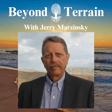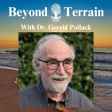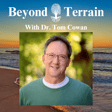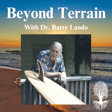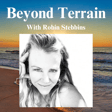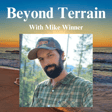Podcast Introduction
00:00:01
beyondterrain
Welcome everybody to another episode of the Beyond Train podcast. I'm your host, Lee of Dalton. We got a great episode on the way today. Uh, really looking forward to it. Um, this is where we see technology and nature sort of getting more in the line, uh, more aligned together. Um, you know, we, we can use technologies. We always talk about this on the, you know, trying to integrate the modern world with getting back to a more.
00:00:30
beyondterrain
natural way of life. So ah we have Tristan Scott on today.
Guest Introduction
00:00:35
beyondterrain
I'm sure we could talk about a great many of topics, but we're going to focus on a really interesting product that he has coming out here. um We'll save it for a few minutes. But Tristan, thank you so much for coming on.
00:00:46
Tristan
Yeah, for sure. man it's ah It's a pleasure. I think i remember we touched base maybe last year at some point, so it's cool to see this conversation happen and everything you've done. and It's a great alternative perspective and a great topic, right the convergence of of nature and modern society.
00:01:07
beyondterrain
definite Definitely. Yeah. Yeah. That's what we're all about.
Defining Health
00:01:11
beyondterrain
Um, so the introductory question I ask all my guests, I want to get your take on this. I'm really eager to hear, uh, we got all of our guests to define health. What does health mean to you? What does it look like? How does it manifest? Love to hear your, your, your insight here. So take it away.
00:01:26
Tristan
Yeah, that's a good one. And I think it's actually a really important question because the metric for what is health has been so skewed, been so, you know, adulterated in a modern world. I actually think that so many of the things that I talk about, you talked about probably as well,
00:01:45
Tristan
they're They're not even really just health benefits, they're they're just like returning to a state of normalcy, a baseline of where humanity should be. So, I mean, in general, health, I feel like is having no limitations in human um you know physiology and what we want to do on a daily basis. if you you know, have vitality, if you have energy, um you if you have recovery, you have the emotional and mental stability, um you're able to do the things you want both physically, emotionally, mentally, as a human being, right? So and that's what it's it's meant for is when we have our health, we can accomplish things and we can accomplish what we're put on this earth to do and then, you know, reproduce as a result of that. Hormonally, um our health is extremely important. So for me, it's not being limited in any capacity for what humans should be able to do. that That's health. it's It's waking up every day and not having to rely
00:02:51
Tristan
on external crutches or exogenous substances to you know get you through your day. it's You're just there. Your baseline is already at that point of output.
00:03:05
beyondterrain
And answer, I couldn't agree more. I think that's a really good way of looking at it. Um, you know, because it's very individual thing, right? It depends on what your goals and dreams are as an individual to, you know, what, what you're able to accomplish. And, um, you know, so people have different standards when it comes to health too. Um, you know, I would probably describe myself as a little bit of a perfectionist. Uh, I'm sure my wife would agree with that, but, um,
00:03:32
beyondterrain
Anyways, you know, like when, when we're talking about health and trying to get back into nature, that's what I always come back to getting back to nature. Um, and you know, we've had this figured out for a long time, getting back to what our, our ancestors did, what they knew. And, um, there's a lot to be learned there. So I appreciate your take. I think that's, that's fantastic. Uh, I'm looking forward to hear about this, this amazing project that you have on the go.
Introducing the Revolutionary Project
00:03:57
beyondterrain
Um, I, I kind of want to just give you the floor to maybe introduce it. Uh, I got a few.
00:04:02
beyondterrain
questions that I can't wait to ask you about it. I think this is revolutionary honestly and and so I'm so eager to hear more about it and learn more about it because really I haven't looked into it greatly so um you know it'd be great for for me and and obviously the listeners I think this is a way forward something that you know I want to sort of integrate into my practice moving forward my life and because and it gets back to this trying to achieve a healthier way of life you know obviously in the modern world it We have big goals and big dreams that rely on this beautiful interconnectedness that we have. Like now we're meeting through these screens, uh, staring at each other through some, some blue light emitting devices. So, uh, it'd be cool if we could do that in a, in a different way without having that harmful blue light.
Mission to Harmonize Technology with Nature
00:04:50
beyondterrain
Anyways, I'll give you the floor. You take it away, man.
00:04:53
Tristan
Yeah, well, you already you know it's it's good to preface you know what we're doing with the situation we're in currently, right? So you so you mentioned this return to nature and and that's really our whole, you know it's been my mission for a few years now and our company mission is we we want to return to what is real and What is real is what our biology is designed to take as an input signal, as the environment that we can thrive in. Right now, we are in an environment, most people, of course, um that is making us sick. It's making us suboptimal. Why? Because it's artificial. It's strayed from the optimal environment of what nature provides us, and we are suffering as a result of that. physically, mentally, um and you know the technological devices that we spend an ever increasing amount of time on in modern day um is very invasive to our biology. right like They're not designed, they're not built with this synergism of the natural world in mind. i Quite the opposite.
00:06:03
Tristan
right They're designed at this point to be quite addicting. you know they They want to keep you on the screens longer because then they're getting the business model benefits from that. And and that's how it's set up. So the big tech companies have have no incentive to change to make a healthier product. And and why are they bad for our health? you know there's There's many reasons, both directly and indirectly. And directly,
00:06:30
Tristan
The screen itself, as as you mentioned, it's it's very high in in blue light, um very low, very unbalanced light spectrum, so very low in red, infrared. Of course, it has no UV light.
Impact of Artificial Light on Health
00:06:43
Tristan
um And this is an unbalanced spectrum that we would never experience in the natural world because in nature, in sunlight, you only get blue with red and infrared. You only get UV with red and infrared. And that's where this whole issue of isolated artificial light comes into play. And then of course, you know, before the sun comes up and after the sun goes down in nature,
00:07:09
Tristan
there would be no light and the light we had for you know tens of thousands of years in terms of fire and candles is very dull it's very rich in the low energy more healing wavelengths of of red and infrared and very very very minimal if at all containing any of the more stimulating high energy wavelengths such as blue And this is completely changing how our physiology is you know taking the environment that it's in. Because if you stare at a blue-lit screen, after sunset, you're going to be altering your circadian rhythm, which you could argue might be the most important aspect of our health, because it's really upstream from everything.
00:07:56
Tristan
it is you know, the clock system and if you have desynchronicity across clocks in any system and the timing's off, you know, you're not going to have a symphony, you're going to have chaos, and you're going to have a lot of actions, a lot of reactions and kind of functions just being off in terms of timing.
Screen Over-Exposure and Health Issues
00:08:19
Tristan
That's what we're seeing, right? That's what we're seeing, you know, chronic fatigue, sleep issues, and then ultimately chronic disease because we're not able to restore and recover due to this poor sleep, due to this inability to ever shut off these non-native electromagnetic inputs. and And for me as an electrical engineer, the electromagnetic aspects of our biology and health is very important, very under-discussed, and absolutely absent from mainstream academia's ah curriculum. And that's why things such as light and EMFs and grounding have
00:09:03
Tristan
been deemed as esoteric and woo woo because it does defy the conceivable notion and and kind of what we can wrap our head around because we can't always see these things.
00:09:15
Tristan
Yet, we're consuming these inputs 365 days a year, 24-7, as opposed to something like food, which is very tangible. We you know put in our mouths. We can taste it. We can feel it. We can see it. you know Seed oils and other things, like when you burn something, it it looks ah bad for us. And you can almost kind of have ah ah you know a natural um reaction or understanding to those items. however if something's invisible and it's just all around us we we barely notice so that's kind of where we're at and these screens yeah they're they're also flickering the leds that's an under disgust
00:09:59
Tristan
negative um characteristic of LEDs and of screens. They're constantly flickering. So you get blue light and you get flicker, which has been kind of undebatably known to aggravate symptoms of autism, cause anxiety, cause ice strain, cause migraines. And then on top of all that, the most detrimental aspect for me of modern technology is that it's keeping us inside. And inside is where all these toxins are really accumulating, and then we're not getting all of the benefits of the outside world, which again, we call them benefits. But in reality, that's just where we're meant to be. So we're really just nutritionally or, you know, and electromagnetically deficient in the right
00:10:49
Tristan
inputs of you know sunlight, of grounding being connected to the earth, the fresh air as opposed to being inside when you're getting whatever amount of VOC is off gassing from the furniture in your house. You have a higher density of non-native radio frequencies and power frequency EMFs.
00:11:08
Tristan
and then of course you have artificial lighting as well and then you're missing out on the benefits of sunlight which when you go outside could be a thousand times ten thousand times brighter that's why we're always like when we go outside can't even see that brightness is a measure of energy density so we're leaving all this energy on the table which is free and accessible to anyone and and the same thing with grounding right like free electrons just available for us to tap into.
Daylight Computer's Health-Conscious Technology
00:11:39
Tristan
So our mission at Daylight Computer is really how do we create technology from the ground up that
00:11:48
Tristan
takes all of these considerations in mind and sort of fixes them. Because right now, what do we have? We have kind of band-aid solutions. You can wear blue light blocking glasses. You can put on a red light screen filter um to get rid of the blue light.
00:12:03
Tristan
They're great. I use them. I'm sure you've used them. But they're pretty terrible in terms of their user experience. Most people will never do it. They don't get rid of Flickr. And then because it's just red, you can actually barely see anything. So that's one piece of it. And then Also, just the addictive nature of the software and kind of this combination of the light and the content is really just keeping us on these devices longer. So so can we do anything about that? What do we do today? You said timers for Instagram or or you try and make your phone grayscale.
00:12:42
Tristan
um Which doesn't even get rid of the blue light it helps from a ah perception But it's really color mixing and then you still have the blue light and then you could get into the weeds of like privacy Security and and sovereignty because that's a huge concern right and it's all tied into one another because the reason why the algorithm is so good is because it's taking your data across all your internet experiences and using that to create a profile and so that it is the content that you want to see that's letting up your brain and then keeping you on there longer. So what if we had a software operating system and and kind of whole experience with the hardware and the software that was just purely built as something for productivity instead of
00:13:29
Tristan
This is a portal. This is the cause coming out of the screen to just keep you there as long as possible. um And that's what we should strive for, right? Like humans are incredible species. We are apex species when we have tools.
00:13:48
Tristan
whether it's you know some spear, or when we had the bow and arrow, or on a horse, or on a bicycle, um or a typewriter, or just having these sorts of things available to us makes us so much better than you know baseline.
00:14:04
Tristan
However, now we live in a world where we have the universe's knowledge at our fingertips. Literally, you can learn anything in the world. You could become an expert in any topic. You can learn any skill, any trade. There's YouTube tutorials. There's books, everything. Like, it's all there. Yet,
00:14:26
Tristan
We're probably declining in terms of how much we're learning in in skill sets. And instead, we're distracted. you know We're on Instagram. We're on TikTok. um We're just kind of worried about what's going on in a foreign country because that's what the media wants us to consume.
00:14:45
Tristan
And we've never ah known less about what's going on in our immediate community, our immediate landscape, our immediate environment. um And then, of course, everything is is tailored around that kind of global connection when what is local matters way more. So we're at an inflection point, I think, and people are aware of it.
00:15:09
Tristan
people are aware that devices are addicting. The screen time thing is like, I mean, even my my friends I live with a few years ago, like, we'd be like, oh, I'm trying to cut down the screen time, blah, blah, blah. And, you know, kid parents and kids, they know that the iPads are just terrible for their kids. But they're so busy as parents that 10 minutes here is a lifesaver turn on the TV. It's something, you know, um just in the modern world, when you can't have a just one parent watching children all day because maybe of the monetary system and the way we're set up economically, ah these are helpful. However, people don't really have an alternative to go to. There is no healthy iPad. There is no a phone that's comparable but, you know, less distracting. And there certainly isn't a big education um wherewithal knowledge about why this is like this.
00:16:05
Tristan
So we think it's the perfect timing and it's really incredible that we've been able to develop a new screen, a new display technology from the ground up and that this has been, you know, five, six years in the making. So yeah, um our our first product, the daily computer one is a tablet form factor that has a new screen um that's kind of taking from the past but making it adapted for the modern world so it's a monochrome screen there's no color it has no blue light
00:16:42
Tristan
No flicker um and then it's reflective at the core. So you can go and use it outside in the sun. It actually, you can see it better. And it's similar to like a Kindle type screen technology. However, the problem with those electronic ink screens is that they're very slow. um So you can only read books on them. We wanted to create something that was fast enough to feel like a piece of paper, but you could still browse on the internet. You could still use apps. You could still answer emails and be productive. And that's kind of what we've built is the best of of both worlds. So if an iPad and a Kindle had a baby and you have a company that's building out a whole ecosystem centered around health and
Vision for a Health-Focused Ecosystem
00:17:25
Tristan
you know What would it look like? And and that's what we kind of always tell people is if Apple started today and really cared about health and wellness and the well-being of its customers, um what would it look like? you know What would a computer company starting from scratch look like? and That's what we're trying to do. And we we launched that product in May. And it's gone really well so far. We're we're sold out for the year. It is definitely quite challenging to balance inventory. And you know just from a monetary perspective, it it costs a lot of money to just bring something like this to market. So it's it's been an incredible experience. And we're really just trying to usher in kind of a grassroots movement, um a community
00:18:11
Tristan
push because it has to be. we you know We're trying to compete with companies like Apple that sell 75 million iPads a year and they have no incentive to change. So even if we can carve out a tiny piece of this market as a healthier iPad that's less distracting, you can use it outside um and eventually we'll have a lot of privacy security features That would be amazing because we could change millions of lives doing so and you know provide people for the first time a real choice, a real alternative because we can eat healthier food. We can wear healthier clothes. We can go outside more. We can you know ditch plastics and PFA cookware. But I'm on a MacBook and I have an iPhone and that's just the reality of the world we live in. So it's about time that we had an alternative that's healthier for that too.
00:19:07
beyondterrain
agreed. Yeah, amazing. Uh, I feel like you hit the nail on the head with, with everything there. Um, I don't even really have much to add to that, you know, yeah um, but of course like these, this EMF, these blue lights, like you hit the nail on the head with the circadian rhythm, especially, um, everybody knows what happens when they don't get proper sleep and blue light is a huge culprit for that. You know, um,
00:19:35
beyondterrain
when it comes to the addiction. Grayscale is something that can help with phone addiction, but like you said, you're not addressing the blue light issue, right? um All these screens are so stimulating. They're so, it's it's a huge issue, right? And and it is it is difficult to to live in the, moment we all say now, oh, I'll switch to a flip phone, but rarely, rarely happens. I think Dr. Mark Bailey is probably the only guy that I know that on a flip phone right now. And you know he's somebody that we should all maybe look up to a little more, but Um, it's, it's amazing, man. I love this project. So cool. Uh, and there is a need, this is, there is a paradigm shift going on. i'm I'm sure you would agree. You know, we are, we are moving into a world where we're becoming more health conscious, you know, even if it is sort of bastardized by the, uh, climate change movement, you know, people do care about.
00:20:29
beyondterrain
at least the health of the environment. And in turn, I think people are caring more about health. They're trying to minimize plastics and, um, you know, one time use. Clothing, even the clothing industry is another whole issue. Um, but you know, like you said, you know, the EMF, the blue light is the one thing that's really hard to control. Um, and this is one beautiful way that we might, obviously it's in its beginning stages. You know, it's coming out as an iPad, I'm sure.
00:20:58
beyondterrain
a computer, a laptop, a computer screen, whatever it may be is in the works as well over time. Um, but I'd love to hear a little bit more about the software, you know, what, what are we able to use on this device? You know, because it's like, you know, it's not a Kindle, right? That's very limited and slow, like you mentioned, but you know, what, what is the capabilities of this device at this point in time? You liken it to an iPad. So what exactly is the,
00:21:25
beyondterrain
the kind of the distinction there between an iOS or an Android type
Custom Operating System for Productivity
00:21:30
beyondterrain
thing there. yeah so
00:21:32
Tristan
Yeah, um I mean, it's really similar to like ah an Android tablet. um So it's running a modified Android operating system currently. um We're building our own OS. That's like what we're doing in its infancy. um So right now, to like in this very moment, there's not a huge distinction, but we've built you know some custom apps. like ah We have a custom PDF reader that we've built that really is is awesome and you can annotate notes if you like reading scientific literature or books or you know you mark up PDFs it's amazing. um The zoom on it is incredible, the responsiveness and just the fact that you can use it in the environment that our device allows for outside, inside at nighttime.
00:22:18
Tristan
But yeah, the goal is really to keep building on the progress from a software ecosystem. And later this year, early next year, we plan to release, I guess, what you would call our our custom OS, which is called Sol OS. And that will be you know still modified, custom version of Android for now, but centered around low distraction, productivity, and really you know just not pinging you with notifications all the time, some custom workflows um and apps, like I mentioned, around that theme and motif. And then over time, you know developing your own operating system, just it takes a long time, right? And and that's the challenge here, but it's an exciting one, is that Apple and Google, they've had decades to build out their OS, their software environment.
00:23:07
Tristan
that decades to kind of like, you know, really optimize their hardware experience as well. So for us, we we appreciate all of our early supporters, like to the highest degree, I mean, I've been using our V1 engineering demo and it's an incredible V1. That's all I have to say is I'm very proud of the team. I use it more and more every day because I feel better when I do. And this software piece long-term is really exciting because that's where we can kind of go on our own. And if we do value privacy and security, which we definitely do,
00:23:44
Tristan
we can bake in features like that directly into the operating system. We can bake in something from artificial intelligence or language models um that really enhance productivity without again capturing your attention or really used in the wrong ways. So by having the hardware interface,
00:24:04
Tristan
and just being in charge and creating the entire computing stack from the screen to the electronics to the software, we can really have this luxury to be the first like full solution centered around what I like to just say, the sovereignty stack right from the physical to the cognitive to the individual level of data and security.
00:24:26
Tristan
and That's where we're going, and it's it's exciting. But yeah, right now, you can download any Android app from the Google Play Store. You can go on Google Mail, Docs, Sheets. You can download Twitter, Instagram. They look completely different, because it's monochrome experience. And I'm currently experimenting myself, trying to spend less time on social media, because you know my my role at Daylight is ever expanding and we're ever increasing in terms of how busy we are. So I only have Instagram on my daylight computer now, and I find that Amazing I use it like I go on there once a day to like check DMS, and then I'm just there writing a few messages Maybe I post a story maybe not and I'm gone same thing with Twitter the Twitter feed is Almost more similar to like at reading a newspaper as opposed to just having all of these Stimulating videos and and written tweets and bright colors so
00:25:23
Tristan
You're just, you know, if you go into a casino and all the lights are grayscale, you're a lot less likely to hang around and pull the slots and and lose all your money. So that's kind of where where I see it. But yeah, that's um the software capabilities. You can connect a keyboard, you know, turn it horizontally and.
00:25:41
Tristan
and write the the tablets are quite versatile form factor and that's why we started there and like you mentioned the roadmap will um does include a phone a full-on laptop monitors much more but we need to be um you know successful and in sales with the with the tablet the v1 first
00:26:05
beyondterrain
Absolutely. Yeah. Yeah. A hundred percent. Uh, it's cool to, to watch something like this kind of get off the ground too, though. I think it's really exciting, um, from the consumer side of things, right? Like, um, watching the software develop and obviously, um, you guys are very transparent and open. Like you mentioned, you're on the DMS answer and that kind of stuff too. Like, you know, you know, there's a really great connection there between.
Privacy and Security in Tech
00:26:29
beyondterrain
the consumer and the like the company, right, which you don't see too often, you know, like try and get through to Apple or Google and good luck. Right. So, um, you know, you mentioned some really interesting things in regarding security and privacy. And I think that is increasingly important in this day and age. Um, of course things with, with like crypto and a lot of people are moving into that. That's a big thing with.
00:26:58
beyondterrain
with security especially, um but just with our general information you know and in regards to our privacy and ah stuff like that. Maybe you could speak a little bit more to that. I'd be eager to hear that because that's that's really an amazing thing that you guys are are integrating into this.
00:27:15
Tristan
Yeah. And it's it's not um a coincidence that like a good core of our leadership team is we're all like Bitcoiners are really into like decentralized money because it all comes back to the money. And when when we're on a fiat standard and it's quite broken,
00:27:31
Tristan
The incentives are completely misaligned. We've seen how that's completely negatively affected our food system, our health care system. And now, what is the the biggest industry that's propping up this entire fiat economy? A ah large part of it is is tech, right? And it's this insatiable need to grow in order to keep up with this expanding monetary supply and you know rampant inflation ah from just you know printing more money because were in this situation in the first place. That's why they're so beholden to their shareholders um because they have to grow. They have to keep growing. So you have to come up with more stuff ah to sell you and they have to do it cheaper so the quality goes down and then you have to spend more time when it comes to tech specifically on these devices. So that's really the business model that they're stuck in. And in order to do that, you know,
00:28:27
Tristan
they're farming all your data, they're using that as you know, an income stream and then also to keep you on the devices longer. And it's just ridiculous, right? We've almost given up like Facebook dilemma came out and then everyone's like all pissed off. And then guess what happened? Absolutely nothing has happened, right? Like we've made no progress. I think people have just fully given up. I mean, even me, right? Like,
00:28:51
Tristan
It's really inconvenient to just leave the modern suite of products, um like Google Mail, like, you know, just using an iPhone or an Android product. And right now, the only workarounds are kind of what you're saying. You have, like, these digital minimalist phones, and then you also have these, like, de-Googled phones. You could run something like a Graphene or a Calix OS, which, again,
00:29:16
Tristan
It's just one piece of the computing stack. It's like this more private, more secure operating system. You can get maybe a little dumb phone and you're trying to piece it together. Almost nobody's doing this except the hardcore people, which I respect them
Decentralized Protocols for User Sovereignty
00:29:31
Tristan
for. But for us, we see this opportunity. It's like, what if we had it all in one solution?
00:29:36
Tristan
What if we integrated decentralized or sovereign software protocols um directly into the operating system? So instead of logging in with Facebook and Google, you're logging in with your 12-word private key, whether that's tied to Noster or tied to Bitcoin or something else, and then you log in and all the apps in the ecosystem, which may be instead of being a part of the Apple monopoly 30% tax app store,
00:30:05
Tristan
is this decentralized web app network that isn't charging people or isn't censoring people for what they're building on there. And we see so many cool projects in this you know sovereign software space in Bitcoin and crypto, all of these folks, right? And they have all the similar problem, right?
00:30:27
Tristan
They don't have a hardware vehicle to get it to the mainstream and the UI UX is a major challenge because why is search why is like just the interface so good for big tech is because they've been working on it for decades and they have all your data. So it it becomes really good in terms of the user experience. So the hurdle for people the average person like you know my mom to set up a Bitcoin wallet or to go on Noster or Farcast or something. It's like so out of the realm of possibility that it's just like always going to be a niche thing. And we have the option to maybe bring it to millions of people because
00:31:10
Tristan
Daylight pay equivalent to Apple pay maybe it could just be Bitcoin lightning under the hood and you don't even realize that's ongoing But it's decentralized and it's not yeah again taking all your data So we have a lot of big dreams there big ideas. We think that's really the long-term Direction we want to move in from a software perspective but It's going to take some time to get there, and we're you know open to all that feedback. But we think people will value that tremendously and really increasingly as we go on over time. But today, the solutions aren't convenient.
Long-term Aspirations for Decentralization
00:31:52
Tristan
They're not amazing. And they're all like one step of the of the process instead of the whole thing.
00:31:58
beyondterrain
Definitely. Definitely. Yeah. And like trying to explain, like crypto is a, is a big thing to sort of learn about. It's a whole field in itself. Right. And, um, I'm not extremely well versed, but even something like web three, I'm familiar with the concept, but.
00:32:15
beyondterrain
I couldn't tell you how to access it or even what it
Accessibility of Advanced Technologies
00:32:20
beyondterrain
is. right like and maybe that's the I think one of the problems is is like you need to understand what it is to be able to utilize these things. and you know ah having the Having it simple, easy to access is going to be absolutely the most important thing um when it comes to integrating these these principles too. right because the the The thing about these these phones and these screens that we're using now, you know it's convenient, it's stimulating, it's addictive.
Social Media's Addictive Impact
00:32:50
beyondterrain
It's like kicking an addiction almost trying to get off social media. i I would say that people are highly addicted to social media um because it's absolutely designed to to do that. But to make the transition from something so comfortable, so convenient, so you know addictive to something
00:33:10
beyondterrain
You know, obviously I believe that we do need to put in the great work and and sort of curb our addictions. ah I think that's an important thing that we need to do. Uh, but making that transition convenient is going to be a very important thing. Um, so that's what I appreciate about about this a lot is because it's, it's all going to be integrated. Like you're mentioning these hardcore guys, man, like, ah, I wouldn't know how to do any of that. You know, like, and so some of these guys out here, you know, they they're amazing at, at cybersecurity and they're amazing at.
00:33:41
beyondterrain
decentralization and they're amazing at sort of being under the radar and off the grid and stuff like that. So it's about facilitating that process. That transition is going to be super, super important. So this project, whenever you talk about it, it's like all of my value is my, my beliefs coming together into one like amazing company. So I'm just, it excites me so much to, to learn more
Innovative Reflective Screen Technology
00:34:06
beyondterrain
about this stuff. Like, um, so that the the screen itself, like if you could maybe and like in easy to understand way sort of explain the technology behind it. You mentioned it's a reflective screen. I'm kind of interested in the, like kind of the science behind it or the physics behind it, you know, it works outside and it reflects the sunlight or like, ah how does it work inside? Does it emit a light whatsoever? What does this monochrome even mean? I'd love to hear a little bit more about that side of things.
00:34:38
Tristan
Yeah, for sure. So I mean monochrome just means like single like color like it's black and white basically. And yeah, we have these micro reflective structures in the screen. So reflective screens are not something that is like new. Again, you know, we've we've had the Kindle.
00:34:55
Tristan
You know your old like Gameboy and calculator some things use reflective screens as well So it's like similar in this regard, but we made some breakthroughs that kind of again address the refresh rate um Issue with a lot of these electronic ink type screens. So it's completely different than that. um However, you're getting a lot of the benefits of it looking like a piece of paper at just a faster speed. So it's 60 frames per second, and you can refresh you know an internet browser just like at a normal speed. However, it has that paper-like feel. Even when you write on it, it it feels very analog, even though it's digital.
00:35:39
Tristan
And another breakthrough we have is the fact that we're using um a backlight. So at nighttime, again, when there's no light in the environment, you can't see a reflective screen really well. So you need to have a combination. and And that's what we've done. So in the sun, you don't need to have any light on. It's purely acting like a piece of paper where it's reflecting the light back into your eyes. And that's a benefit. Why? Because that's how nature works. you know The trees i'm I'm staring at through my window right now are green. ah The leaves, because they're reflecting green light back. They're absorbing most ah they're absorbing all the visible spectrum and then reflecting green. That's how nature works. Whereas screens are very emissive. They are you know emitting light back at us. and that's like
00:36:29
Tristan
very unnatural. The only emissive sources of light in nature are typically um the sun and fire. So that's um just like a completely different experience. um So at nighttime, when we have no light,
00:36:45
Tristan
We need some. So we have a backlight as well. But this isn't an ordinary backlight that, say, like a Kindle has or or another device has. It's custom LEDs that we have hand-selected the light spectrum to be much more synergistic with our biology. It has an amber backlight. So again, I talked earlier about red light screen filters and blue light blocking glasses. They're great. But your screen is dark red. Like, I don't know. Where am I?
00:37:15
Tristan
I don't know where I put my phone but I have the triple click shortcut and you know it turns your phone red. That's cool. No blue light. I love it. But you can't see anything and then you actually have to turn the brightness up a little bit more in order to actually see anything.
00:37:30
Tristan
So if you listen to people like Huberman and you know some of these other people that are kind of like dancing a little carefully around blue light, they like to say this. They like to say that the intensity of the light matters just as much as the spectrum. And that is true. um The light intensity does matter tremendously. So if you have a red screen and it's cranked all the way up in brightness, then that's not ideal either. And then you can't see anything, so you're probably like never gonna use it.
00:38:02
Tristan
Our spectrum, it's more spread out. We have a little bit of green, a lot of yellow, orange, and red. So it looks amber. It looks more like a candle. And that broad spectrum spreads out the power density of the wavelengths. And then because your photoreceptors are far more sensitive to green and yellow,
Advantages of Amber Backlight
00:38:23
Tristan
You can actually see it at a far lower intensity, see it better. So you don't need to have the brightness very high. And the way, you know, we're able to do that with a reflective screen is really cool. We're able to have these like micro perforations in the screen to let this backlight shine through um the paper like.
00:38:43
Tristan
what we call live paper screen technology. So you have the ability to just adjust the brightness and then adjust the warmth of the screen, which is really cool. So you can look at a you know a screen at nighttime, actually see it and not have to worry about you know blue light exposure or very high intensity light exposure.
00:39:03
Tristan
So those are all innovations. so We have three patents on the screen technology. It's really exciting. you know This is the core kind of differentiation and my founder worked on this for five, six years with a lot of researchers in Japan and some in Europe.
00:39:22
Tristan
and yeah it's um It's pretty cool stuff. And as someone electrical engineer who likes to measure light spectrums and everything, like just geeking out on how we're trying to get as close to nature as possible is is really cool. So if you ever you know want to learn more about that, you know it's a cool topic to dive down into. But just know that like the red LED light bulb is a great idea, but it's still like very inconsistent to what would exist in nature. Just this very isolated peak of red light. It would almost never exist. And if you take a measurement of a fire, it has, again, a tiny, tiny amount of like green, a lot of yellow, or sorry, more yellow, more orange, more red, and then a ton of infrared. And that's kind of what we're trying to work towards.
00:40:16
beyondterrain
That's awesome, man. So the does it emit infrared? Did you mention that, or might did I miss that?
00:40:22
Tristan
No, yeah, that's that's um not yet not yet.
00:40:26
Tristan
We're cutting off definitely right at like infrared. Getting infrared LEDs is um you know more of a challenge, especially in a consumer electronic form factor. But that's, again, that's an area where we can get better.
00:40:38
Tristan
So first product, we like have all these ideas how we can continuously improve. And that's an area where then maybe it's not even neutral. It is actually a benefit because near infrared light can help improve kind of the the photo damage from, you know, in your retina from toxic blue light exposure. So then we're in an entirely different ballpark,
Myopia and Technology Use
00:41:04
Tristan
right? But even using it outside in the sun can provide benefit to your eye health, right? Especially from a field of vision myopia ah perspective, which is debatably the most prevalent, like serious health issue worldwide. 80 to 90% of like teenagers in eight Asia have myopia, like 90% in China. That's, that's crazy.
00:41:32
beyondterrain
I, I have myopia ah said ah and right.
00:41:35
Tristan
We all do to some degree, I think.
00:41:37
beyondterrain
Like, I mean, and I spent a lot of time looking at screens now, like my main goal is kind of trying to find some balance, man, because it's like, it's, it's like, unless your kids are really unplugged, man.
00:41:50
beyondterrain
And it's quite a balance that you want to strike because you don't necessarily want to. you know, disadvantage your kids either and have them not understand what technology is at the same time. So this is why we're seeing this as such a benefit, right? Like to be able to, you know, it'd be really interesting to see, and maybe there is some literature on this, but like, you know, I mean, I know that there's literature on blue light and the connection to myopia. There's, there's a ton of literature on that. Um, you know, this amber screen and its connection, if it's lesser or stuff like that, i'm I'm not really familiar with that.
00:42:23
beyondterrain
area of the literature, but it would be cool to sort of explore that and, um, to see the different, different associated issues with blue light and compare it to, uh, this screen, right. To see like circadian rhythm measurements. I don't know how you would measure that. Uh, but you know, even like a self-reported sleep scales, things like that to see, you know, a little bit of a connection, right. And we're.
00:42:48
beyondterrain
not in pure scientific method here, but, but you could certainly get some sort of information out of it. It'd be interesting to see that kind of stuff. I'm sure that'll all come down the road. It's, it's time, it's money. It's, you know, like, uh, so it's really, really, uh, a whole thing there, but this just excites me. Like I've said that so many times, but it's really an amazing project, you know, from, from so many different avenues, like, um,
00:43:16
beyondterrain
To me, the number one thing is, is that you're able to use it outside, you know, and that's huge in itself. You can be outside in the grass and use your screen without having to worry about the glare and squinting at your computer, stuff like that. I think that's just amazing. So, um, it is an electronic device. So I think maybe one of the potential downsides might be, uh, like non-native EMFs coming out of the device itself. Um, maybe you could speak a little bit to that.
00:43:46
beyondterrain
My sort of rebuttal to that, um but I'd like to hear your thoughts on both is you can use it grounded. You know what I mean? I think grounding is the number one thing that we should all be doing to sort of minimize our, at least minimize the damage from EMFs, non-native EMFs, you know, cause you're, you're resetting that electrical charge in your body, right? You're connecting with the earth, right? It's very, obviously very healing. So.
00:44:13
beyondterrain
um I see that as maybe one of the potential downsides, but again, it's only you know relatively speaking compared to the downsides of a regular screen. you know it's it's still a bet It's still an improvement, right? So maybe I could hear your thoughts on that.
Concerns about Non-Native EMFs
00:44:29
Tristan
And this is kind of like my, I guess, you know, area of expertise or like passion, um, in the deepest realm. And yeah, I am a hundred percent like not native EMFs are a problem. So there's thousands of studies showing that radio frequencies specifically would never be exposed to radio frequencies at this, you know, intensity and this duration, uh, this distance constantly.
00:44:54
Tristan
um It's really a giant science experiment. and They're not even studying 5G frequencies. There's no incentive. So here we are, another societal science experiment. Again, like I said earlier, we're being blasted with this stuff 24-7, 365 days a year. you know That's why things like turning off your Wi-Fi and um cutting your power to your bedroom, which I do, at nighttime, they actually do matter. um It does add up. So in terms of our devices, yes.
00:45:23
Tristan
All technological devices, especially your phone, um are problematic in my opinion. The phone is the worst by far of and anything because why? You're on it the most. It's the closest distance to your body. It's pinging cell phone towers. It's pinging Bluetooth. It's pinging Wi-Fi networks. And that is all inundating you know our biology with non-native EMF exposure. and the cell phone towers, the phone calls, the messages, those are the highest power. And then Wi-Fi and then blue to Bluetooth is a far lower power than that. So that all matters. Getting to the daylight computer, what have we done? What do we want to do? um At the hardware level, nothing has been optimized on this V1. That was just
00:46:10
Tristan
not a priority we started with the light and again light is an electromagnetic field as well visible light but we're talking about radio frequencies here um nothing at the hardware level however in the future especially now that i'm on board and we're going to be bringing you know, kind of a higher priority priority to this. We have like, we have a clean slate of investigating, right? Like once you acknowledge that these things are problematic, you can go and investigate. What does it look like if we have a little bit more, you know, filtering or some shielding or a different Wi-Fi chip, or there's some targeted angle of ah the electromagnetic wave outwards that's more kind of, it's it's reduced.
00:46:53
Tristan
um What does that do to exposure? What does that do to overall electromagnetic field exposure, EMI? and We don't know, but we want to find out. We want to experiment and we do. We want to create the healthiest piece of technology possible. So we are fully on board and we support
Smart Airplane Mode Development
00:47:11
Tristan
What we have done is, you know, we are developing a smart airplane mode feature um on the software side. So it sounds, you know, cool. It's really simple. It's just when you're not using the internet or you don't need to be connected to the internet, your tablet, your daily computer. will automatically go into airplane mode, right? Because what am I doing? I'm constantly like putting my phone into airplane mode. I always have you know the cellular data off regardless. If I do, I have Wi-Fi on. Bluetooth is almost always off. What if your device just did that by default? And then when you did need to use the internet, um it would connect.
00:47:49
Tristan
um there's some software plays that we can do there that I mean that could reduce exposure by a lot because knowingly almost nobody is is doing that so if you give it to your you know toddler or something to watch a video maybe it's downloaded and then it just goes into airplane mode or or maybe if you're just taking notes or reading a PDF it's already there you don't need to be connected to the internet and then you don't have to worry about it sitting on your lap like it's zero distance to your body. um You know we also have a Bluetooth free stylus which is not, I mean it's part of it but I think really is what you said.
00:48:28
Tristan
If we can get outside, get our feet on the earth, we're going to get a source of free electrons flowing, which is nature's antioxidant really for the body. So it's going to help combat any oxidative stress you have, whether that's from artificial light, from non-A to BMFs, from seed oils, whatever.
00:48:47
Tristan
That's helpful, but then you're also tapping into having your feet on the ground, the Earth's natural electromagnetic fields. Being outside, you're going to have a higher degree of interaction and reception to the Earth's natural magnetic fields, and you're going to have a lower degree of interaction with non-native electromagnetic fields. So typically, again, where is the Wi-Fi router the strongest? And especially if you're in an office or you're in a high population area, indoors is almost always going to be higher EMF exposure, just density of devices and then power. People really underrate the effects of electrical power. And when you have it running throughout your walls and your bedroom and say you're in a small room,
00:49:31
Tristan
you're far closer. Whereas if you're just outside, I mean, you don't need electrical power lines to be close by if you're just working in a park. So that's learning exposure. You're getting more of the the native inputs from the natural magnetic and electric fields of the earth, especially if you're grounding and you're getting all the beneficial you know light yeah EMFs as well. So I think it's a combination of that, but I'm really personally excited. I used to work directly in electronics and you know for me to be involved in potentially bringing like the lowest SAR phone and the lowest you know radio frequency EMF like tablet or computer to market. that is It's so exciting because again, it's fully possible from an engineering perspective. You just need to set that as a goal, an achievement. How do we do it? how do we Even if you bring it down, like
00:50:27
Tristan
50% that could be, that could be massive, right? Like that we have just an unknown ah impact or also effect from the devices we're using. And there are no studies, there are, you know, nothing really out there on that. So we can hopefully pioneer this movement and be, you know, again, ah a solution for those that are very electro hypersensitivity or sensitive or just sick.
00:50:58
beyondterrain
Amazing, man. Amazing. Yeah. Well, this excites me
Integrating Nature into Technology Use
00:51:02
beyondterrain
too. Honestly, I think this is amazing. I love the whole project. I love the philosophy behind it. I love your passion. Uh, I love the literally everything to do with it. You know, for me, it kind of checks all my boxes, you know, in my journey and, um, to, to sort of integrate nature into the life that we live. Right. Because, yeah you know, the answer might not be a cabin in the woods. Um,
00:51:26
beyondterrain
It's kind of nice to connect with people. Uh, we got to connect today. I'm really grateful for that. I've got to connect with some amazing people on this podcast. Um, I just, I just love that side of things, you know, so ah minimizing increasing our, our ability to, um, utilize technologies in a more healthy manner. It's just, it's perfect. It's amazing. So.
00:51:53
beyondterrain
I definitely appreciate what you guys are doing over there. If you guys have like if you have any final thoughts on the episode, I'd love to hear them now. Anything you might have missed, anything you want to add that we didn't cover, anything you want to emphasize, I'd love to hear that now.
00:52:05
Tristan
Yeah, I mean, again, like I said, it's it's all about just returning to to what's real. right like We are designed for the natural world. um And everything we're doing in this modern lifestyle is taking away from that. That's why we're sick. you know Chronic disease is proliferating. Mental health crises are through the roof. It's not rocket science. it's It's really simple, actually. But it's very challenging in a modern world. If you have a 9 to 5, if you're just you know doing what you can to get along you can't just you know go outside all day or yeah move to a cabin in the woods land is quite expensive like it's you can't just move to the beach often you might have a family so what can you do and you know for me i realized this anecdotally years ago on my own healing journeys the more time spent outside the better i felt
00:52:56
Tristan
So I'm going to keep doing that. And now I know the science as to why that is, but you don't need to teach all that science to, you know, just a wild animal living out in nature. They're just doing it. And I'm a big proponent of embracing your local environment to the highest degree, everything from light to food to temperature.
00:53:17
Tristan
Think of it like that. It has everything we need for it. And all we want to do as a company is how do we get these productivity benefits from technology, these knowledge benefits, um but still live in that world, still live in the world we were designed for and just make something that is complimentary instead of completely removing us from that. So yeah, it's it's really exciting. Again, I mean,
00:53:45
Tristan
It's desperately needed, I think. And we we appreciate you for for having me on here. We appreciate anyone who's supported us, engaged with us on on social media or purchased a product. And we're just getting started. So it's a fun road
Vision for Natural and Healthy Living with Tech
00:54:00
Tristan
ahead. And I think this is going to be part of the greater movement of a return to reality. And this is going to be a fun transition period over the next few years, decades, who knows. but Matt, it's a dream come true for me and I'm really excited to continue to to spread this message and we're open to any feedback, what people want to see. Like you mentioned, we're trying to be very transparent, very responsive. This is a grassroots movement. That's what it's going to take. you know If we want to have a healthier version of Apple, it's going to take you know people pushing it in their local school systems or people you know telling everyone they know who has kids because
00:54:42
Tristan
Let's set this the next generation up for success instead of failure, um because we know how much more sensitive they are to these electromagnetic inputs. And we're seeing that firsthand. So we have an opportunity to intervene and and you know change the trajectory completely. And let's do it.
00:55:03
beyondterrain
All of it. Yeah, let's do it. All right. How do we learn more from you, from the company? How do we access this website, social medias? What do we, where do we find you?
00:55:15
Tristan
Yeah, so daylightcomputer dot.com is our website. um Like I mentioned, we're technically sold out right now. However, you can place a $100 deposit ah that will give you priority access. And we are actually, you know, do have some buffer inventory. So we've been kind of reaching out to some deposit holders um as part of, you know, placing it very early on. So that's a way um day at Daylight Co is our social media. We're on Instagram, we're on Twitter. If you want to get in contact with us, you can email us hello at daylightcomputer dot.com. Whether you want to be an ambassador, we're building out a program to have brand ambassadors plug us into their online local networks.
00:55:59
Tristan
If you work for a school, if you you know have any questions in general, any opportunities, please contact us. We'd love to talk to our community. And then yeah, me personally, I'm at Tristan underscore health on Instagram at Bitcoin and beef on Twitter. And yeah, that's a book I wrote a few years ago. So big proponent of of that stuff. And yeah, that's um what we're doing, where we're at.
00:56:28
beyondterrain
no Awesome, dude. Well, I really appreciate your time. I appreciate you coming on here and sharing the vision and the, this message, this project. I think it's amazing. So thank you so much for coming on today.
00:56:38
Tristan
Thanks man, I appreciate it.
00:56:41
beyondterrain
Always. Yeah. Well, thank you all for listening. You should all know that this is not medical advice. I guess we didn't really get too, too deep into that today, but this is for your racial purposes only. But let's also remember that we're all responsible, sovereign beings, capable of thinking, criticizing and understanding absolutely anything.
00:56:57
beyondterrain
We, the people in the greater forest are together, self-healer self-governable self self-governable, self-teachers, and so much more. Please reach out to any questions, criticisms, comments, concerns, whatever it is. Find me up beyond terrain on Instagram. You guys know where to find me at this point. Shoot me a message if you want to chat. I really appreciate all you guys for for taking the time to listen today. I really appreciate all your time. um And so if you found it informative in any way, give us a like, share, comment, subscribe, whatever you're going to do on the platform you're on helps us grow.
00:57:24
beyondterrain
Sharing is always the best way to get the word out there and to support us as well. So share with a friend, family member, stranger on the street. That'd be greatly appreciated. All right, guys. Remember there are two types of people in the world. Those believe they can, those believe they can't, and they are of course both correct. Thanks for listening. Take care.


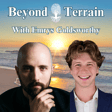
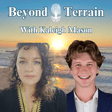
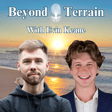
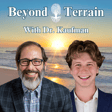
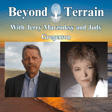
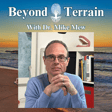
![DNA Doesn't Exist & Genomic Nonsense with Dr. Jerneja Tomsic [Part 2] image](https://media.zencastr.com/cdn-cgi/image/width=112,quality=85/image-files/652933f3a749dc383eb375de/ce5a5fd9-98c9-44fe-9b4b-3d0cd5abcf29.png)
